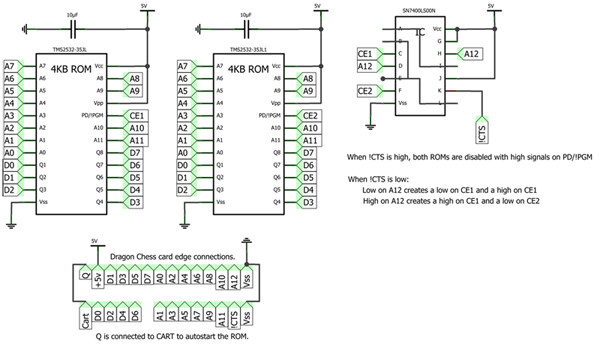Re: Schematics of Dragon Cartridges?
Posted: Wed Feb 20, 2013 12:47 am
Yes, I saw the scans, but some connections are hidden by the NAND (Pin 11, Pin 1, the two inputs 4 and 12 seem to be connected, but I cannot see, what's fed in). I own no cartridge, so I can't simply make some measurements. But as Rink pointed out, there is no need anymore to take small EEPROMS and choosing a single, bigger one would simplify the circuit.
I'm new to that machine, and really don't know the games and programs available, but the 16k limit for cartridge space is a problem of course. That's probably hardcoded by the circuit and can't programmatically be changed by some kind of loader? Hm, and D32 games usually don't fit into 16k? So, only the more simple games could be relocated. Probably it's too big an effort and not worth doing it. I don't know...
So maybe the youtube-video "Dragon 64 connected to a HxC 2001 Floppy Emulator" (http://www.youtube.com/watch?v=pB__S8HuzOA) shows us a better solution, but where do you get a floppy controller cartridge from? Those seem to be rare. That's more or less the idea of Rink with a cartridge based loader that loads from cartridge memory instead of cassette tape.
Thank you everybody for your help. I got to do some research and reading first and don't wan't to waste your time with maybe no so good ideas .
.
I'm new to that machine, and really don't know the games and programs available, but the 16k limit for cartridge space is a problem of course. That's probably hardcoded by the circuit and can't programmatically be changed by some kind of loader? Hm, and D32 games usually don't fit into 16k? So, only the more simple games could be relocated. Probably it's too big an effort and not worth doing it. I don't know...
So maybe the youtube-video "Dragon 64 connected to a HxC 2001 Floppy Emulator" (http://www.youtube.com/watch?v=pB__S8HuzOA) shows us a better solution, but where do you get a floppy controller cartridge from? Those seem to be rare. That's more or less the idea of Rink with a cartridge based loader that loads from cartridge memory instead of cassette tape.
Thank you everybody for your help. I got to do some research and reading first and don't wan't to waste your time with maybe no so good ideas
